Announcement
Get Ready for INDUS CUP 2K26! | Dates: 5–10 January 2026 | Stand a Chance to Win Cash Prizes up to ₹10,00,000!...Read more Get Ready for INDUS CUP 2K26! | Dates: 5–10 January 2026 | Stand a Chance to Win Cash Prizes up to ₹10,00,000!
We are excited to announce the Indus Hackathon 2025, an exhilarating one-day event organized by the CSE Department of Indus University....Read more We are excited to announce the Indus Hackathon 2025, an exhilarating one-day event organized by the CSE Department of Indus University.
26th ISTE Faculty Annual State Convention will be held at Indus University on April 27, 2023....Read more 26th ISTE Faculty Annual State Convention will be held at Indus University on April 27, 2023.
Get Ready for INDUS CUP 2K26! | Dates: 5–10 January 2026 | Stand a Chance to Win Cash Prizes up to ₹10,00,000!...Read more Get Ready for INDUS CUP 2K26! | Dates: 5–10 January 2026 | Stand a Chance to Win Cash Prizes up to ₹10,00,000!
We are excited to announce the Indus Hackathon 2025, an exhilarating one-day event organized by the CSE Department of Indus University....Read more We are excited to announce the Indus Hackathon 2025, an exhilarating one-day event organized by the CSE Department of Indus University.
26th ISTE Faculty Annual State Convention will be held at Indus University on April 27, 2023....Read more 26th ISTE Faculty Annual State Convention will be held at Indus University on April 27, 2023.

Constitutional law refers to the body of principles and rules that govern a government's fundamental structure, powers, and functions, as well as the rights and liberties of individuals within a society. It is based on a country's constitution, considered the land's supreme law. Constitutional law serves as a framework for the organization of a government and provides a system of checks and balances to stop abuses of power.
Studying for a law degree is of utmost importance as it delivers a deep understanding of the principles and values upon which a society is built. It allows individuals to comprehend the rights and freedoms granted to them by the Constitution, ensuring that they are aware of their entitlements and can exercise them effectively. Moreover, constitutional law plays a crucial role in maintaining the balance of power among different branches of government, safeguarding the Rule of law, and protecting citizens' rights.
The roots of constitutional law can be traced back to ancient civilizations such as Ancient Greece and Rome, where the concept of written laws and governing principles emerged. The Magna Carta of 1215 in England is often regarded as a significant milestone in the development of constitutional law. It established limitations on the monarchy's power and recognized certain rights of the nobles, setting the groundwork for protecting individual liberties.
The American Revolution and the subsequent drafting of the United States Constitution in 1787 profoundly impacted constitutional law worldwide. The U.S. Constitution established a novel system of government based on the Separation of powers, creating a model for democratic governance. The French Revolution also influenced the development of constitutional law with the adoption of the Declaration of the Rights of Man and of the Citizen in 1789.
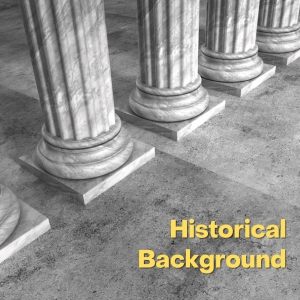
Constitutional law and BA in LLB have evolved and adapted to societies' changing needs and values. It has been shaped by significant historical events such as the abolition of slavery, the expansion of civil rights, and the recognition of gender equality. The interpretation of constitutional provisions has been refined through landmark court cases and legal precedents, reflecting societal progress and struggles for justice.
Throughout history, constitutional law has played an important role in creating governance and protecting human rights in numerous countries. Knowledge of constitutional law's historical roots and evolution provides a contextual understanding of its principles and helps to grasp the need to protect constitutional rights and liberties. Individuals who study this subject get the knowledge and tools they need to engage in informed debates, preserve their rights, and actively participate in the democratic processes that define their society.
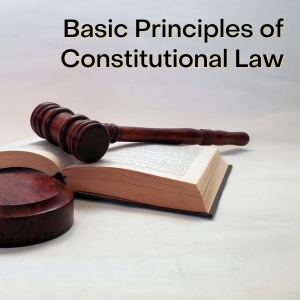
The principle of Separation of powers is a fundamental aspect of constitutional law taught in BBA LLB ensures the distribution of governmental authorities among different branches of government. Typically, a constitution delineates the management of the legislative, executive, and judicial branches, creating a system of checks and balances. This Separation aims to prevent the concentration of power in any one branch and serves as a safeguard against potential abuses. By studying constitutional law, individuals gain an understanding of the Separation of powers and its role in maintaining a stable and accountable government.
Federalism is a principle that divides power between a central government and regional or state governments. It establishes a dual system of governance in which both levels of government possess certain powers and responsibilities. Constitutional law delves into the allocation of powers between the federal and state governments, the relationship between them, and the limits of their authority. By studying federalism in law courses, individuals can comprehend the complexities of shared governance and the interplay between different levels of government.
Judicial review is the power of the courts to review the constitutionality of laws and government actions. It allows the judiciary to determine whether a law or action violates the Constitution's provisions. This principle empowers the courts to protect constitutional rights and ensure that governmental actions align with the Constitution's provisions. Understanding judicial review during an LLB law degree is crucial for comprehending the judiciary's role as a guardian of constitutional rights and liberties.
The Rule of law is a principle that asserts that all individuals and entities, including government officials, are subject to the law. It promotes fairness, equality, and accountability within a legal system. Constitutional law explores the concept of the Rule of law and its implications for governance, ensuring that the government operates within legal boundaries and treats all individuals equally before the law. All these rules and principles are added to the BA LLB course and all the BA and BBA LLB colleges have this included in their curriculum.
Due process refers to the fair treatment of individuals under the law and the protection of their rights. It guarantees that individuals cannot be deprived of life, liberty, or property without proper legal procedures. Constitutional law delves into the concept of due process and its application in various contexts, such as criminal proceedings and administrative actions. Studying due process helps individuals understand their rights and safeguards against arbitrary actions by the government.
Constitutional law recognizes the Constitution as the supreme law of the land, establishing its authority over all other laws and regulations. It provides the framework for the organization of government, defines the structure and powers of various institutions, and sets forth the rights and liberties of individuals. Understanding the constitutional hierarchy is essential for all students pursuing an LLB law degree.
Constitutional law involves interpreting and analyzing the provisions and clauses within a constitution. These provisions outline the rights and responsibilities of the government and its citizens. Studying constitutional law in LLB colleges allows individuals to understand how the judiciary interprets these provisions, how they shape governmental actions, and how they protect individual rights. The LLB Law course duration is of 3 years.
Constitutions often provide a mechanism for their amendment or revision. Amendments can introduce new rights, modify existing provisions, or adapt the Constitution to changing societal needs. The constitutional law study explores the significance of amendments and their impact on the legal framework. By examining past amendments, individuals can gain insights into the evolution of constitutional rights and the processes for change within a constitutional system.
By understanding the basic principles and structure of constitutional law, individuals can navigate the complexities of constitutional governance, exercise their rights effectively, and contribute to developing and preserving a just and democratic society.
Constitutional law encompasses the recognition and protection of fundamental rights and freedoms essential to the well-being and dignity of individuals within a society. Some of the key fundamental rights and liberties studied in constitutional law include:
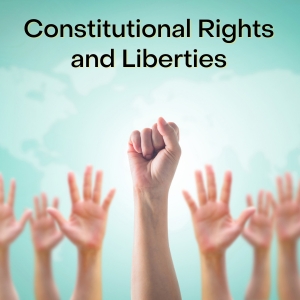
These are the LLB Law course details which are taught to all the students of LLB Colleges.
Constitutional law also encompasses civil liberties, which are rights and freedoms that protect individuals from government interference and arbitrary actions. These liberties include the freedom of assembly, the right to a fair trial, the prohibition of cruel and unusual punishment, and protection against unreasonable searches and seizures. Studying constitutional law provides an understanding of these civil liberties and their significance in upholding individual autonomy and limiting government overreach.
Constitutional law requires a delicate balance between protecting individual rights and safeguarding public interests. Sometimes, rights may conflict with each other or broader societal needs. Constitutional law explores the principles and mechanisms for balancing these competing interests, often through applying proportionality tests or considering compelling state interests. This ensures that the exercise of rights does not undermine public welfare or jeopardize the rights of others.
The judiciary plays a vital role in interpreting and applying constitutional law. It is tasked with resolving disputes, clarifying constitutional provisions, and ensuring the Constitution's consistency and coherence. The courts give meaning to the constitutional text through judicial interpretation and establish legal precedents that guide future cases and decisions.
Constitutional interpretation involves different methods and approaches. Some common approaches include originalism, which seeks to interpret the Constitution according to its original intent or understanding, and living constitutionalism, which acknowledges that its meaning can evolve to address current societal needs. By studying these methods and approaches in the LLB course, individuals gain insight into how judges analyze constitutional provisions and reconcile their interpretation with changing circumstances.
Landmark court cases have played a pivotal role in shaping constitutional law. These cases often involve significant legal disputes and have far-reaching implications for constitutional interpretation and rights protection. Studying landmark court cases in law courses allows individuals to grasp the impact of judicial decisions on constitutional principles, understand the evolving nature of constitutional law, and appreciate the judiciary's role as a guardian of constitutional rights and liberties.
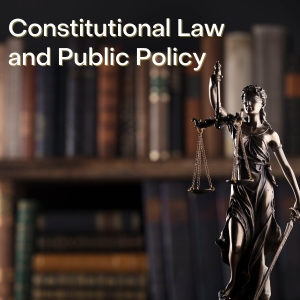
Constitutional law places limitations on the actions of the legislative and executive branches of government. It establishes the boundaries of governmental authority and outlines the procedures and processes that must be followed. Constitutional limitations ensure government officials act within their prescribed powers, preventing abuses and ensuring.
Comparative constitutional law involves studying and analyzing different constitutional systems across countries. By comparing and contrasting various constitutions, scholars and practitioners can gain insights into different approaches to governance, the protection of rights, and the structure of institutions. Comparative analysis helps identify similarities, differences, and best practices, which can inform constitutional reforms, policy-making, and legal scholarship.
Studying the constitutional experiences of other countries allows individuals to learn from successes and failures in constitutional design and implementation. By examining the challenges faced by different constitutional systems and the responses they have generated, one can develop a nuanced understanding of the strengths and weaknesses of various constitutional approaches. This comparative knowledge can help inform constitutional reforms and contribute to the improvement of constitutional frameworks.
International human rights standards, such as those enshrined in treaties and conventions, significantly influence constitutional law. Countries often incorporate these standards into their constitutions, providing a framework for protecting and promoting human rights. Comparative constitutional law explores the impact of international human rights norms on domestic constitutional systems, highlighting the importance of global human rights standards in shaping constitutional principles and practices.
Constitutional law continuously grapples with emerging challenges and debates as societies evolve. These may include problems such as the balance between safety and civil liberties, the recognition of new rights and identities, or the appropriate answer to technological advancements. By studying contemporary constitutional challenges, individuals can confront pressing issues and contribute to the ongoing discourse on constitutional rights and governance.
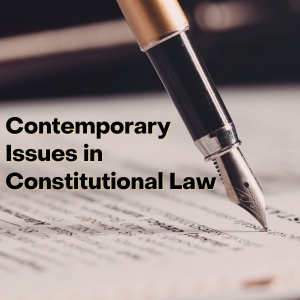
The digital age curriculum of LLB course colleges presents unique constitutional challenges, including privacy concerns, freedom of expression in the online realm, and the regulation of emerging technologies. Constitutional law explores the application of existing constitutional principles to these digital issues and investigates the need for new legal frameworks to address the digital landscape's complexities.
Intersectionality refers to the interconnectedness of different social identities and how they shape an individual's experiences and vulnerabilities. Constitutional law examines how intersecting identities, such as race, gender, sexuality, and disability, intersect with constitutional rights and protections. This exploration in the LLB Degree helps illuminate how constitutional principles can address systemic inequalities and protect the rights of marginalized communities.